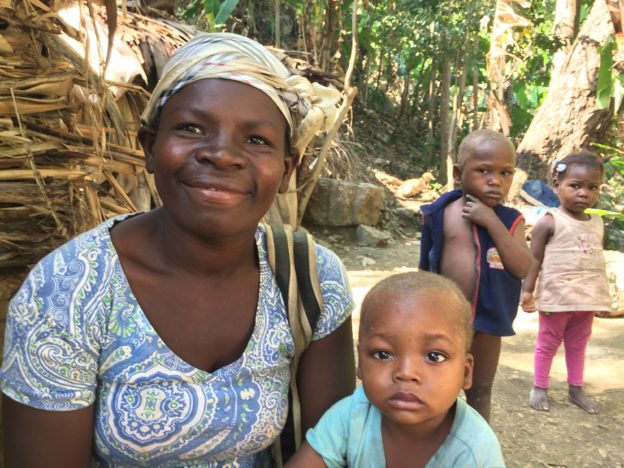Working with Juslène is going to be challenging. She is cheerful and seems willing to work, but she also seems to have some kind of developmental disability. The people around her say she is egare, which means something like scatter-brained. Her memory seems to be very poor. She can’t say, for example, how many months old her infant boy is. And she seems to lack basic knowledge. She could not, for another example, identify by name a couple of colors I pointed out to her. She is still marking receipts with a thumbprint even as her fellow members begin to sign their names. Though she and her case manager work dutifully in her copybook every time he visits, she cannot yet reproduce even the J her name starts with.
She’s moving forward with construction of a new home. In her case, there was no question of repair. She has been living in a corner of her sister-in-law’s house ever since her own was destroyed in a storm. So she and her husband have to build a new one. And since they have no land to build it on they rented a plot a couple of hundred yards from the sister-in-law’s place. They’ve had the frame built, and will put the roof on soon.
But Juslène has forgotten how much of her money they paid, and she’s forgotten how many years they’ve leased the plot for. When I try gently to provoked her memory, her sister-in-law chimes in rudely from across the yard with the rental price — 2500 gourds, or about $37 — and she adds a few choice words about Juslène.
Juslène has had trouble with her livestock as well. Her pig died of Teschen disease. She will be able to recuperate some of the loss. She sold the meat. But when a butcher buys an animal that has died, she generally does so with credit. The woman who bought Juslène’s pig says that she’ll pay in March.
One of Juslène’s goats had two kids, but they both died almost right away. According to Juslène, they never had the strength to stand. The other goat is pregnant, and though we teach CLM members to keep careful track of their livestock’s pregnancies, Juslène can’t say when the goat got pregnant or how long the pregnancy will be.
When I ask Juslène what she is planning to do to keep herself fed once her stipend runs out in just two weeks, she still doesn’t know. But she responds cheerfully, “M pa konnen. M ap rete.” Or, “I don’t know. I’ll do without.”
In a sense, it is not surprising that we find women like Juslène among those we work with. For someone like her, it might be difficult not to be extremely poor. Titon, her case manager, has his work cut out for him. The most reliable way to improve the family’s situation might be to work more with her husband than with her. And that’s probably part of what Titon will do. He’s dealt with similar cases already. But he’ll need to do it without dismissing Juslène or locking her out of the picture. Only a commitment from him to integrate her into everything he does with the family offers any hope of help her personally make whatever progress she can make.
